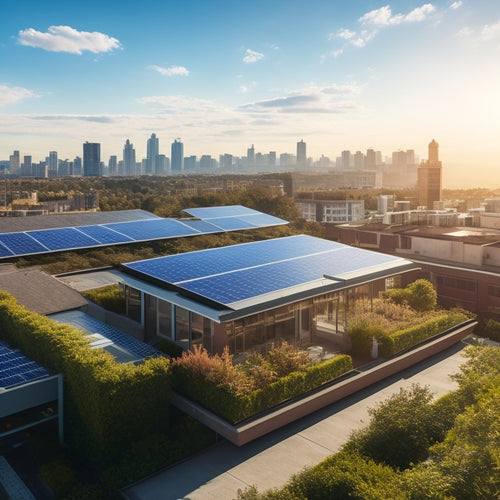
Optimize Energy Output: Effective Cleaning Tips for Homeowners
Share
You've invested in solar panels to harness the sun's power, but neglect can slash energy output by up to 25%. To optimize energy output, prepare for cleaning by decluttering the area and gathering necessary supplies like microfiber cloths and eco-friendly cleaners. Choose the right cleaning tools and water sources, and handle panels with care to prevent scratches and moisture exposure. Establish a cleaning schedule, inspecting for debris and dirt daily, and deep cleaning seasonally. By following these tips, you'll be on your way to maximizing your solar panel's energy output - and that's just the beginning of unleashing your system's full potential.
Key Takeaways
• Regularly clean solar panels to maintain efficiency, as dirty panels can reduce energy output by up to 25%.
• Use soft-bristled brushes and microfiber cloths to clean panels, avoiding harsh chemicals and abrasive materials.
• Establish a cleaning schedule to prevent neglect and perform daily visual inspections for dirt or debris.
• Deep clean panels seasonally to remove accumulated dirt and inspect panel components every 6 months for optimal performance.
• Verify voltage and current readings after cleaning to ensure proper functionality and optimal energy output.
Understanding Solar Panel Functionality
You invest in solar panels to harness the sun's energy and reduce your reliance on the grid, but do you know how they actually work? It's not magic, we promise! Solar panels are made up of photovoltaic (PV) cells, which convert sunlight into electrical energy.
These cells are made from semiconducting materials like silicon, which release electrons when exposed to sunlight. The flow of these electrons generates an electric current, and voilà! You've got clean energy.
The PV cells are arranged in a grid-like pattern on the solar panel's surface, allowing them to capture as much sunlight as possible. The energy efficiency of your solar panels depends on various factors, including the quality of the PV cells, the panel's angle, and the amount of shade it receives.
Pre-Cleaning Preparation Essentials
Before tackling that dusty solar panel or grimy floor, gather the necessary cleaning supplies and gear to guarantee a successful cleaning session. You don't want to be stuck halfway through, realizing you're out of cleaning solution or don't have the right scrubber. Take a few minutes to gather your arsenal: microfiber cloths, all-purpose cleaners, a soft-bristled brush, and some good ol' elbow grease.
Clearing clutter is important in this prep stage. You can't clean what you can't see, right? Implement some decluttering strategies to get your space organized. Pick up any items that are out of place, and put them away in their designated spots. This will give you a clear path to cleaning and make sure you don't knock anything over or misplace important items. Remember, a clutter-free zone is a clean zone!
Choosing the Right Cleaning Tools
Three essential cleaning tools every homeowner should have in their arsenal are a reliable vacuum, a versatile mop, and a trusty all-purpose cleaner. These tools will help you tackle any mess that comes your way.
When selecting a vacuum, look for one with an ergonomic handle that fits comfortably in your hand, reducing fatigue and strain. A vacuum with adjustable suction control and a variety of attachments will also make cleaning a breeze.
For your mop, opt for one with microfiber options that can pick up dirt and grime effortlessly. A mop with an adjustable handle and a large head will cover more ground in less time.
Finally, your all-purpose cleaner should be gentle on surfaces yet tough on dirt and grime. Choose a cleaner that's eco-friendly and has a pleasant scent to make cleaning more enjoyable.
With these three tools, you'll be well-equipped to tackle any cleaning job that comes your way. By choosing the right tools, you'll be more efficient and effective in your cleaning routine, freeing up time for more important things... like binge-watching your favorite show!
Safe Water Sources for Rinsing
When it comes to rinsing, you'll want to make sure you're using a safe and reliable water source to avoid contaminating your cleaning efforts.
You have three main options to evaluate: municipal water supply, well water quality, and rainwater harvesting.
Understanding the pros and cons of each will help you make an informed decision for your cleaning needs.
Municipal Water Supply
You can rely on your municipal water supply as a safe and convenient source for rinsing, as it's treated and monitored to meet or exceed the Environmental Protection Agency's (EPA) safety standards. This means you can focus on cleaning without worrying about the water quality.
Additionally, using municipal water supply encourages water conservation, as it's a more efficient way to use this precious resource compared to individual well systems. By relying on the municipal water supply, you're also supporting a more streamlined supply chain, reducing the likelihood of contamination and ensuring a consistent flow of clean water.
When it comes to rinsing, you can trust that your municipal water supply has been tested and treated to remove impurities, making it perfect for washing away dirt and grime. This not only gives you peace of mind but also helps you conserve energy by reducing the need for additional water treatment steps.
Well Water Quality
If you're among the 15% of American households relying on well water, it's important to make sure your well water quality is up to par for safe rinsing. You don't want to risk contamination or mineral buildup affecting your cleaning efforts. That's where water testing comes in. Regular testing guarantees your well water meets safety standards, and you can identify potential issues before they become major problems.
Here's a breakdown of what to look for in your water testing results:
| Parameter | Acceptable Range | Potential Effects |
|---|---|---|
| pH Level | 6.5-8.5 | Affects cleaning product effectiveness, skin irritation |
| Total Dissolved Solids (TDS) | <500 mg/L | Impacts taste, odor, and cleaning performance |
| Hardness (Calcium & Magnesium) | <180 mg/L | Affects cleaning product performance, scaling |
Rainwater Harvesting
How can you guarantee a steady supply of safe water for rinsing, even in areas prone to drought or water restrictions?
The answer lies in rainwater harvesting, a clever way to collect and store rainwater for non-potable uses like cleaning. By installing a roof catchment system, you can collect rainwater that would otherwise flow down the drain. This water is then stored in a water storage tank, ready for use when you need it.
Rainwater harvesting is a win-win: it reduces your reliance on municipal water supplies and decreases stormwater runoff. Plus, it's a cost-effective way to keep your home clean and tidy.
Imagine having a steady supply of water for rinsing, even during water restrictions! With a well-designed rainwater harvesting system, you can breathe easy knowing you've got a backup plan for those dry spells.
Effective Cleaning Solution Recipes
When it comes to effective cleaning, you don't need to rely on harsh chemicals. You can create your own cleaning solutions using natural agents like baking soda, vinegar, and lemon juice, which are gentle on surfaces and the environment.
Natural Cleaning Agents
You can ditch harsh chemicals and still achieve a sparkling clean home by harnessing the power of natural cleaning agents, which are often gentle on surfaces and the environment.
One of the most versatile natural agents is baking soda, a gentle abrasive that can tackle tough messes without scratching surfaces. Mix it with water to create a paste for scrubbing away stubborn stains or odors.
Essential oils are another natural powerhouse, providing a invigorating scent while also possessing antibacterial properties. Certain oils, like tea tree oil, have natural disinfectant properties, making them perfect for tackling germy areas like doorknobs and countertops.
You can add a few drops of essential oils to your natural cleaning solutions for an extra boost of freshness and cleanliness. By incorporating these natural agents into your cleaning routine, you'll not only create a healthier environment for your family, but you'll also reduce your environmental footprint.
Easy DIY Mixes
With a few simple ingredients and some creativity, you can whip up effective cleaning solutions that are gentle on surfaces and the environment. By mixing and matching natural ingredients, you can create a range of cleaning solutions that are perfect for tackling common household messes. And the best part? These DIY mixes are often more effective than store-bought cleaners!
Here are some of our favorite kitchen hacks for creating effective cleaning solutions:
| Mix | Ingredients | Use |
|---|---|---|
| All-Purpose Cleaner | 1 cup water, 1/2 cup white vinegar, 1 tsp baking soda | Countertops, sinks, and faucets |
| Natural Disinfectant | 1 cup water, 1/4 cup lemon juice, 1 tsp tea tree oil | High-touch areas, like doorknobs and light switches |
| Tile and Grout Cleaner | 1 cup baking soda, 1/2 cup hydrogen peroxide, 1 tsp castile soap | Tile, grout, and showers |
| Wood Furniture Polish | 1 cup olive oil, 1/2 cup lemon juice, 1 tsp beeswax | Wood furniture, like tables and chairs |
These natural remedies are not only effective but also eco-friendly and budget-friendly. Plus, they're easy to make and customize to your cleaning needs. So, get creative and start mixing your way to a cleaner, greener home!
Avoiding Damage to Panels
Proper care in cleaning electrical panels is vital, as even slight scratches or moisture exposure can render them inoperable. You don't want to be the one responsible for turning your energy-efficient haven into a dark, powerless cave.
To avoid this scenario, it's important to handle your panels with care. When it comes to panel handling, you should always wear soft, dry gloves to prevent scratches and fingerprints. Make sure your cleaning tools, like soft-bristled brushes or microfiber cloths, are free from debris and moisture.
Cleaning Frequency and Scheduling
Here's the output for the CURRENT SUBTOPIC:
Cleaning your electrical panels regularly is just as important as handling them with care, and establishing a schedule guarantees this vital task doesn't fall by the wayside. You don't want to be stuck with a dirty panel that's reducing your energy output, do you? To avoid this, create a cleaning schedule that works for you.
Here's a suggested cleaning schedule to get you started:
| Frequency | Task |
|---|---|
| Daily | Quick visual inspection for obvious dirt or debris |
| Seasonally | Deep clean electrical panels to remove dirt and debris |
| Every 6 months | Inspect and clean panel components, such as fuses and circuit breakers |
Inspecting for Debris and Dirt
As you prepare to clean your electrical panels, start by inspecting them for debris and dirt that may be obstructing airflow or posing a fire hazard. A thorough visual examination is vital to identify any potential issues. Take a close look for signs of dust accumulation, which can reduce the panel's efficiency and even cause overheating.
Check for cobwebs, dead insects, or other unwanted visitors that might be making themselves at home in your electrical system.
Don't forget to inspect the vents, grills, and air intakes for blockages or debris. A simple glance mightn't be enough, so take your time to carefully examine each component.
Remember, a clean electrical panel isn't only more efficient but also safer. By identifying and removing debris and dirt, you'll be ensuring your electrical system runs smoothly and reduces the risk of breakdowns or even fires.
Post-Cleaning Performance Check
After cleaning your electrical panels, you'll want to conduct a thorough performance check to make sure they're running efficiently and safely. This step is essential in guaranteeing your system optimization efforts pay off. You've put in the elbow grease, now it's time to reap the benefits of improved energy efficiency.
Here are three key areas to focus on during your post-cleaning performance check:
-
Voltage and current readings: Verify that your electrical panels are functioning within the recommended specifications. Any deviations could indicate a deeper issue that needs attention.
-
Heat generation: Check for excessive heat emanating from your electrical panels. Elevated temperatures can lead to reduced energy efficiency and even safety hazards.
-
Energy output: Monitor your energy output to ensure it's within the expected range. This will give you a clear indication of whether your cleaning efforts have improved your system's overall performance.
Frequently Asked Questions
Can I Clean Solar Panels During Peak Sun Hours?
"Don't clean solar panels during peak sun hours, you'll reduce their efficiency! Instead, do a morning inspection to identify dirt and debris, then clean them during a cooler part of the day for peak efficiency."
Are Microfiber Cloths Safe for Cleaning Solar Panels?
When cleaning solar panels, you're right to wonder if microfiber cloths are safe - the answer is yes, but it depends on the microfiber quality and cloth durability, so choose wisely to avoid scratching those panels!
Can I Use a High-Pressure Washer to Clean Solar Panels?
"You're wise to wonder if a high-pressure washer is safe for solar panels, but don't risk damaging them! Avoid using it, as excessive Water Pressure can compromise the panels' integrity; instead, opt for gentle Washer Maintenance and cleaning methods to keep them shining."
How Do I Remove Stubborn Dirt or Debris From Panels?
You'll need some elbow grease to tackle stubborn dirt and debris on your solar panels! Try using a soft-bristled brush, mild soap, and distilled water for gentle cleaning, or opt for a specialized cleaning solution for tougher grime.
Can I Clean Solar Panels Myself or Should I Hire a Pro?
You're wondering if you should DIY or hire a pro to clean your solar panels? Consider this: if you're not comfortable with heights or don't have insurance coverage, liability concerns might make hiring a pro the safer bet.
Related Posts
-

Charging Points in Rural Areas: 5 Key Insights
When driving through rural areas, you'll face a shortage of charging points, making EV ownership stressful and inconv...
-

What You Need to Know About RV Solar Maintenance
When you're out on the road, your RV's solar panel system is your lifeline. But without regular maintenance, you're l...
-

What Is the Cost to Put in Solar Panels
You're likely considering solar panels for your home, and the most significant factor in your decision is the upfront...


